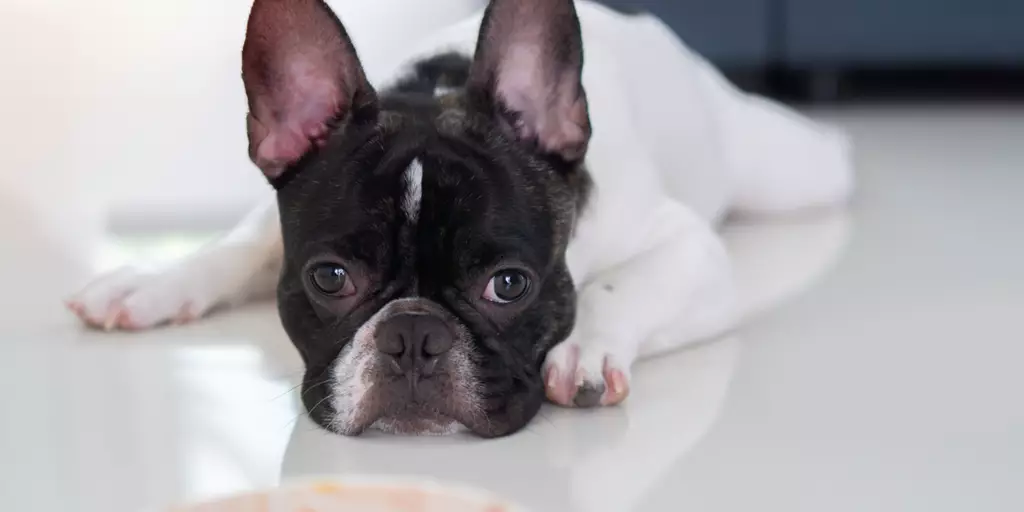10/5/2023
Why is My Dog Not Eating Their Food?

Being a pet parent is extremely rewarding, but it does come with some challenges. One of the more difficult problems is dealing with a dog that just won’t eat their food.
Seeing your best friend pick at their food at mealtime can be quite worrisome. Are they okay? How can I make sure they eat enough? The good news is that you’re not alone. Plenty of pet parents have dogs who go on food strikes – the key is figuring out why your dog won’t eat. Let's explore some reasons why your dog isn’t chowing down their food.
9 Reasons My Dog Won’t Eat
If your best friend lost their appetite, it’s time to do some research. There are several potential reasons why dogs won’t eat their food, some of which are more serious than others.
- Health issues: Some dogs lose their appetite when they don’t feel well. Whether your best friend has a sensitive stomach or is under the weather, they may not eat like they did before.
- Dental problems: Your dog is much less likely to eat if it hurts to chew. Keep an eye out for loose or broken teeth and make sure to practice proper doggy dental care.
- Stress or anxiety: Stressful situations can take the joy out of eating. Anything from separation anxiety to dealing with fireworks can make your dog too uneasy to eat.
- Notable changes: Significant changes in a dog's environment or routine can affect mealtimes, such as a new schedule, a recent move, or some other disruption.
- Spoiled food: Dogs have an incredible sense of smell, and they can tell if it’s gone bad. Make sure to properly store your dog’s food so that it doesn’t spoil before it’s served.
- Overfeeding: Feeding your dog too much food can cause a problem. Dogs may skip meals if they've been given too many treats or if you’re giving them table scraps (which pet parents shouldn’t do).
- Too much energy: Food helps fuel your dog. If your dog has a ton of energy and would rather zoom around, they might just need to burn some of that energy before they’ll want to eat.
- Other pets: Your dog may want to eat but feel pressure not to. Some dogs may be shy eaters and not want to have dinner around other animals (especially if another pet shows signs of food aggression).
- They’re picky eaters: Some dogs just aren’t that into their food. If a kibble gets too boring or isn’t tasty enough, your best friend may pass on dinner until they get something more exciting.
What Should I Do When My Dog isn’t Eating?
As a pet parent, you want your furry friends to be happy and healthy. Whether your dog is dealing with an issue where they can’t eat or they simply don’t enjoy dinner, it’s concerning to see your best friend skip out on meals.
When you want to support your fur best friend you need to have a plan in place. Follow these steps to help solve why your dog isn’t eating and address any other underlying issues.
- Monitor their behavior: The first step is to keep a close eye on your dog's overall behavior and health. Try and see if your dog is acting differently or if there are any signs that may indicate why your dog is avoiding their food bowl.
- Check their food: Look to see if anything is wrong with your dog’s food. If the quality is off, try getting some fresh food.
- Rule out health issues: Don’t be afraid to talk to your veterinarian. A phone call or a vet visit can help rule out underlying health problems that could cause a lack of appetite.
- Limit treats and avoid table scraps: Don’t go overboard with treats or other dog snacks if your dog is ignoring their main meals. Make sure treats make up no more than 10% of your dog’s diet and avoid human foods altogether.
- Maintain a schedule: Dogs love routine, so stick to a consistent feeding schedule as much as possible. If recent changes may have affected mealtime, try switching back to see if it brings back their appetite.
- Keep eating stress-free: Eliminate any variables that may stress out your dog when they eat. For example, feed them separately from other pets or keep the house nice and quiet to remove potential stressors or distractions.
- Add tasty toppers: Sometimes your dog just wants a little extra flavor. Adding some wet food or a frozen topper to their kibble can help entice dogs that need a little more excitement added to their meals.
- Change their food: Sometimes your dog just needs to find some new food that they’ll enjoy. Look for a dog food that’s formulated to please picky eaters – like Bil-Jac Picky No More dog food – and while no transition is required with Bil-Jac, it is important to feed according to recommendations on the bag.
Throughout this process, it’s important to stay calm. Extra stress will only make the situation more difficult, so be patient and don’t show frustration during this process. Instead, encourage them with positive reinforcement when they do eat and keep trying when they don’t. If your dog still isn’t eating after several days or you notice a dramatic change in eating or behavior, contact your veterinarian right away.
Of course, every dog is different. It’s all about finding a solution that works best for your furry friend – and don’t forget that some extra love and cuddles may help as well.
Want to learn more about how you can help support your dog? Sign up for the Best Friends Club to receive our exclusive monthly email newsletter filled with dog care tips, special access to members-only discounts, and more.








